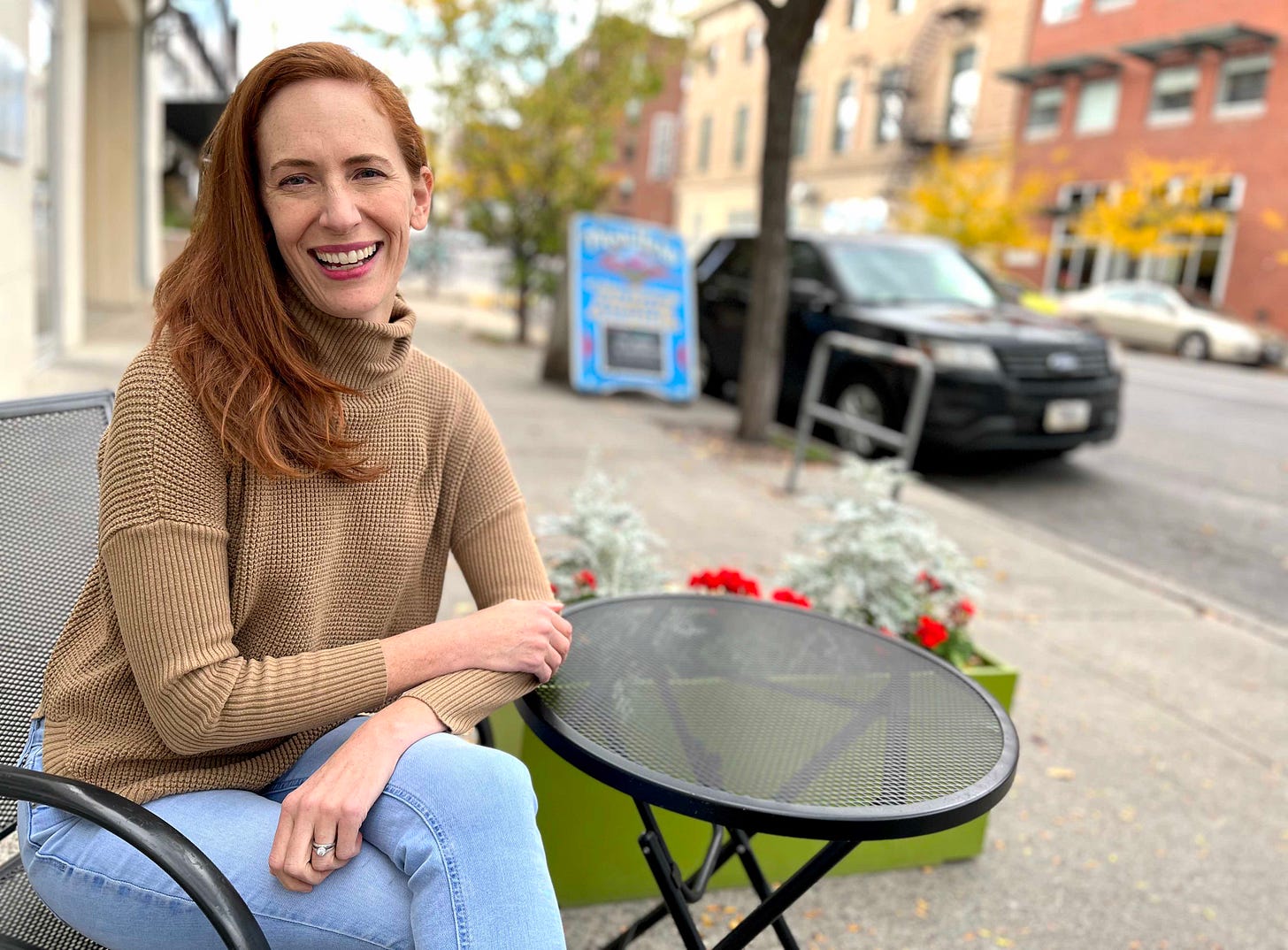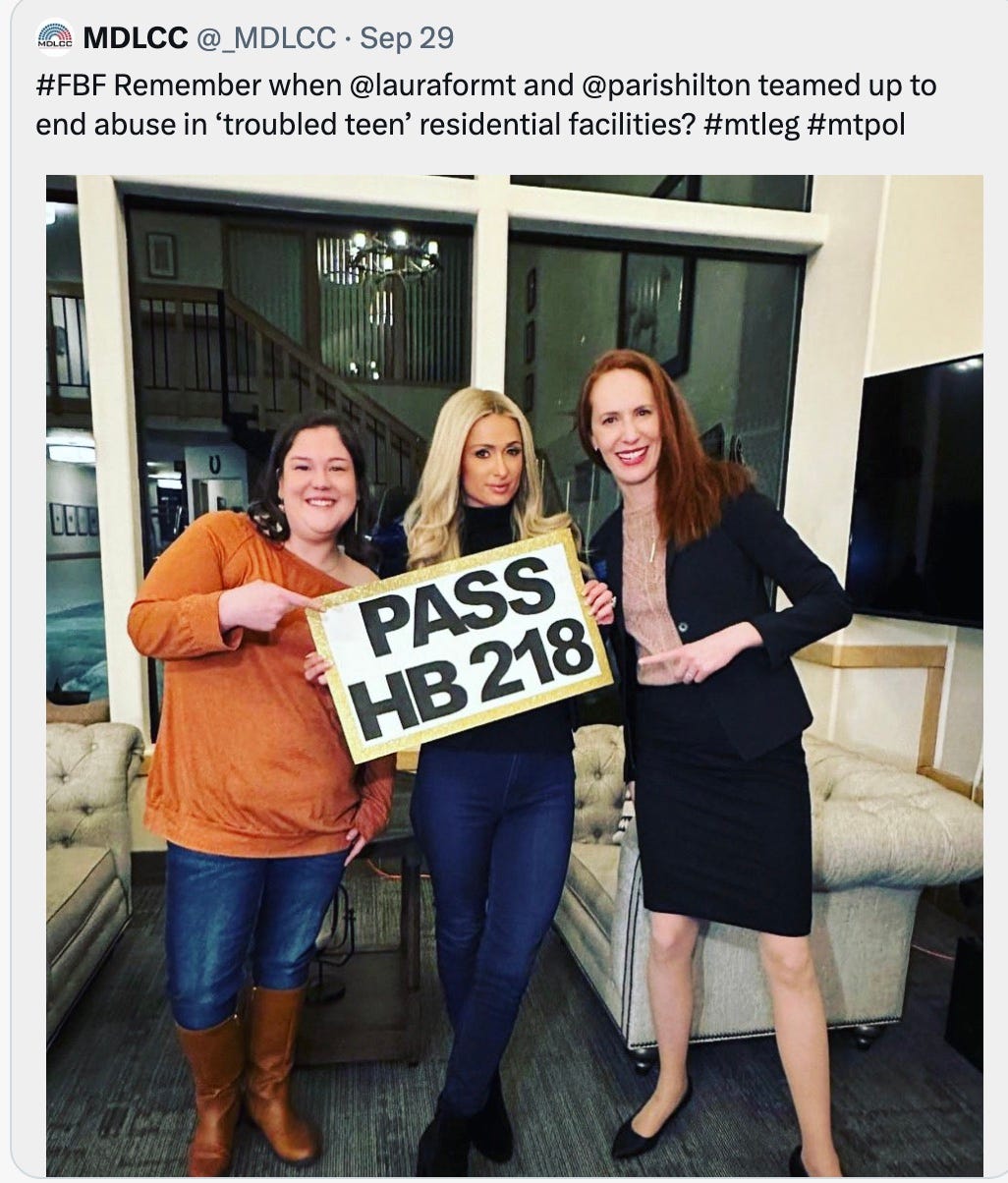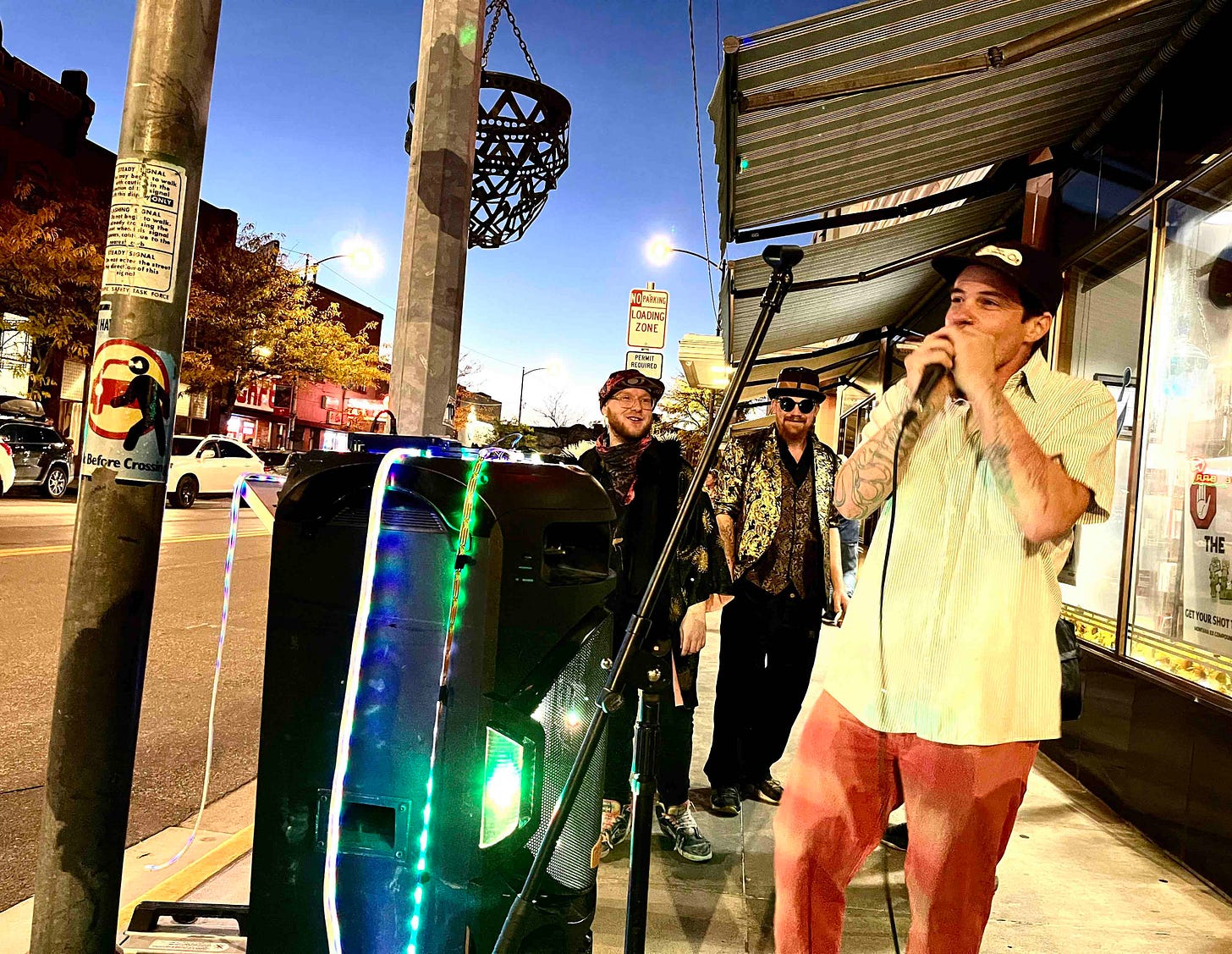Rep. Laura Smith calls BS
Plus: Comedian / musician Reggie Watts chats about his new memoir...and AI
Welcome to Big Sky Chat House— a newsletter of candid conversations with movers and shakers in Montana.
If you found this email in your Promotions folder, please move it to your Primary inbox. That will make it easier to find down the road, and teach Gmail to send it to other subscribers’ Primary inboxes as well.
During her freshman legislative session this year, Representative Laura Smith (D-Helena) came out swinging.
A former federal prosecutor—and the former deputy director of DPHHS under then-Governor Bullock—Smith set her sights on a series of issues related to children’s safety during the session, with significant success.
Her most prominent piece of legislation, House Bill 218, puts substantial regulations on residential centers for “troubled teens.” Smith’s work on the bill brought her into collaboration with an unexpected partner: megastar Paris Hilton.
Smith additionally ran a bill to expand the definition of incest in Montana to include nieces and nephews, and another to restrict the use of restrains on youths.
Governor Gianforte signed all of these bills into law in May.
Since the session ended this spring, Smith has maintained her loud advocacy for various issues and policies in Montana. For one, in July, she attempted to lobby the Gianforte Administration to reverse their rejection of $10 million in federal funding for meals for school children.
In late September, Smith kicked off a series of social media posts titled “Laura Calls Bull,” in which she accuses the state GOP of, well, BS.
Additionally, in early October she launched an investigation of sorts into the state’s contentious property tax rebate plan, by utilizing Montana’s brand-new Right to Know law, which puts strict deadlines on the state to respond to public records requests.
Amidst all of this work, Smith announced in September that she will run for Senate District 40, west of Helena, next year.
Read on as Smith digs into her experience working with Paris Hilton on HB 218, explains why she suspects nefarious intent surrounding the tax rebate program and discusses how she thinks Montana Democrats can regain ground in the state legislature.
Note: this interview contains a graphic description of teen abuse.
Max: What are your takeaways from the ‘23 session? Does the session inform your next moves?
Rep. Laura Smith: One of my core issues last session—and it will be a core issue for me the rest of my life—is safe childhood. I will go down swinging on any safe childhood issue. I would say that I was surprised by—and I know it may sound cliché—how much shared space there is on safe childhood. HB 218, the bill to better regulate the troubled teen industry, had some strange twists and turns in the Senate, but [GOP state Senator] Barry Usher, who I have known since 2017 when I worked at DPHHS, was willing to sit down, talk about the bill and carry it for me on the Senate side. He was passionate about it. He was ready for the floor session.
It's really easy to get sidetracked by the wedge issues and particularly wedge issues that are meant to super-fire our brains and our amygdalas into thinking that someone else is “the other.” It's probably one of the hardest things to do, when you truly disagree with someone and you think what they're doing is going to harm someone.
Some people wouldn't necessarily pair Barry and me together. But the truth is, we're both straight shooters, and we both do not want kids to be abused in wilderness programs. And it meant a lot to me that he carried the bill and that we actually found some common ground. That bill was a fight. There was a lot of misinformation [during the Senate debate over it].
What was the thrust of the opposition to the bill?
There were some folks on the Senate floor who made claims about kids in wilderness programs that just were not true. Just for background: there are these remote wilderness programs that are privately run and for a long time were not well regulated.
Every account over and over from kids who had been abused in these programs had a lot of common themes. Kids were strangled or beat or denied food, or denied winter clothes and forced to walk barefoot in the winter. These kids are “capital W” wounded from this experience.
Kids were kept from telling their parents about the abuse. Staff would monitor their phone calls, they would hang up the phone before a child could tell their parents. The program staff would mislead parents and say, “Oh, your child's going to lie. They're gonna say that we're abusing them.” For those that are not doing it with integrity, it's a dark business.
And then, in the Senate, there were portrayals of the industry by folks who had connections to the industry. There were portrayals of these children [that they] can physically overtake you and they're manipulated; fictions about the trauma that kids have undergone.
When I was at DPHHS, we received a hotline call in 2019 about a program by the Canadian border. We did a big investigation, worked with almost a dozen law enforcement agencies at every level and removed 31 kids in one day.
I've seen in my other work as a prosecutor, how much childhood and trauma and childhood impacts the trajectory of the entirety of your life.
I imagine that having a celebrity like Paris Hilton in the mix as an advocate could be a double-edged sword. Did it feel that way to you?
I had watched Paris Hilton's documentary online and was pretty shocked to see that her brand—which is smart and has made her millions of dollars with the sort of high-pitched voice and all that stuff—is not who she really is. At least major parts of it are not who she really is.
And so I watched that documentary and I reached out when I was working on the bill because I knew she had done advocacy and her team had done advocacy on [this subject]. I just literally googled “Paris Hilton contact information” (laughs). I didn't expect to hear from anyone. I pretty quickly got an email back. And the first meeting that I had with her and her team, I was floored by her thoughtfulness.
I spent a lot of time trying to figure out at what point do we mobilize that profile, right? Because it could go one of two ways: People could resent her because they have an idea of who they think she is, or they could resent me because they perceive that I'm trying to bring attention to something through celebrity.
I viewed her, and still view her, as one of the most powerful, smart and traumatized, frankly, advocates in the troubled teen industry. And so when the bill moved over to the Senate and it had some opposition from Brad Molnar that was pretty relentless, I called Paris Hilton's folks and I said, would you be willing to get on a Zoom call with people from the Senate side to talk about the bill?
She said, yes. That Zoom call, I think, was very, very helpful. There were several Republican senators on it who asked really thoughtful questions and had the opportunity to see her advocate for an issue that she's really passionate about and traumatized by. And so I think it had a net positive effect and I was really mindful of when that might be helpful versus hurt the cause.
It all shook out in the end and the bill passed and was signed into law. I learned a lot about strategy; sort of building the plane while you're flying it.
What other childhood issues are on your plate?
The first thing that comes to my mind is the kids kicked off of Medicaid.
And P-EBT is an example. There was $10 million on the table [for meals for school children that Governor Gianforte’s administration declined earlier this year].
Literally, it's one piece of paper and you sign it. USDA said, we understand this can be complicated. We will be flexible to simplify it. So this summer, that was one of the major issues that got me really fired off. Don't sacrifice kids in the name of politics when you've got 40-plus other states who said yes to it, including states like Florida. It doesn't have to be political.
[Note: On October 10 (after Rep. Smith and I spoke) state officials announced they plan to apply for the next round of EBT funding in January 2024.]
Switching gears: why did you decide to run for state Senate, and not for the House again?
After the session—having been a Democrat freshman who got several bills [passed]—several people very quickly approached me about running for the Senate seat. My current [House District] 79 is nested inside of the Senate [district]. And I've knocked on more than 3,000 doors in HD 79. I feels like a no brainer to run for it. It allows me to focus on policy for longer and less on campaigning [since a senator serves a four-year term, versus a two-year term in the House].
You recently launched a series of posts on social media called “Laura Calls Bull.” What are your goals there?
The idea for that series came from the P-EBT [situation]. I was so frustrated that there was $10 million on the table. [During a rally for the funds] I asked this friend who had helped organize it, can I swear on the microphone? And he said, no, but you can say “bull.”
I also started getting calls from constituents in the last month [about the property tax rebate]. People were really frustrated. It's nearly impossible to complete. You can't complete it in one sitting. It asks things like, what is the geocode for your property? Well, that requires you to understand that you have to look at the Cadastral. What's the Cadastral? If you haven't been on the Cadastral before, how do you find a geocode?
I am a legislator. I have the ability to ask questions. I also have the ability to utilize this new Right to Know Senate law, sponsored by [Democratic state Senator Janet Ellis], that puts into place very specific timelines for when public records requests need to be responded to, so the government doesn't drag its feet.
[Some provisions of the bill] went into effect on October 1. So I started making a list of constituent concerns, and then I built a series of questions off of that.
But I ended up talking to the Department of Revenue deputy about some of these concerns, and told him that I was sending this letter [containing the questions]. It's a very detailed letter: do you have data on the people that were rejected? Why were they rejected? How many people started the application process and then abandoned it? Do you have a customer feedback survey?
Either people had never heard of the opportunity to apply, or when they did apply, they had so much red tape that it made it really difficult. We'll find out. And that right to know bill [ensures that] it's not going to be two years before they get back to me.
Do you think there was nefarious intent to keep people from applying for the rebate?
I sure hope it's not, but it looks like it is.
I mean, where there's smoke, there's fire. I know that individuals who work at DOR are extremely hardworking. And this is not [the actions of] the average worker or the assessor.
I have an obligation to ensure that my constituents are experiencing a good government. When I see and hear stories like that, it's not good government.
You've got a $2 billion surplus. You somehow raised property taxes and then you're making it impossible for people to get their money back that they paid in.
We call bullshit.
Before we wrap up—how do you think Democrats can regain some ground in the state legislature?
I think redistricting is the foundation of that, in terms of ensuring fair representation across the state.
Lately I have been thinking about the early days of Montana, and particularly some of the robber baron history. Frankly, I think that we're seeing it again. I think the average person is getting boxed out of having an affordable life. And time and time again in the 2023 legislative session, myself and Democrats prioritized fairness. We did not prioritize corporations. We did not prioritize out-of-state corporations. There was one party that did that and it wasn't Democrats.
There are massive inequities that fall on the backs of working Montanans that were captured in bills last session that were inherently not fair. And I think ensuring that we continue to communicate that reality is really important. That's part of the reason I'm doing that BS series. I think the more information we can get out there, the better.
This conversation has been edited for length and clarity.
One more thing (or two)…
I had an awesome time interviewing the incomparable musician, comedian and beloved weirdo Reggie Watts for Montana Free Press. We dig into his new memoir about growing up in Great Falls, his support of Rep. Zooey Zephyr, his optimistic take on AI and much more.
You can read the interview here!
I was pretty jazzed about how this photo of (BSCH alum) and general Missoula man-about-town Jesse Blumenthal turned out. Jesse is a consistent force for the best kinds of weirdness in Missoula, and his improvised harmonica performance during this month’s First Friday celebration was no exception (although some passerby may have felt differently).
Thanks so much for being here. In the meantime, you can always reach me via email, the comment section below, or on the Elon Machine, @SavageLevenson.




